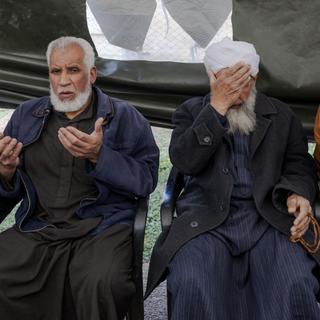


In Syria, Israel and Turkey maneuver for power
In DepthSince the fall of Bashar al-Assad, Israel has exploited the weakness of the new Syrian government to carry out cross-border operations in the name of its security, while Recep Tayyip Erdogan seeks to assert his influence in the region.
At the forefront of the border triangle between Syria, Jordan and Israel, the Syrian village of Kuwaya offers a panoramic view of the fertile lands irrigated by the Yarmouk River flowing below. It also showcases how Israel asserts its presence in the landscape. Abderrahman Al-Moufla, the mokhtar (or mayor) of Kuwaya, pointed to a nearby hill on the ridge line. Up there is the Syrian village of Maaraba and, recently, a new position of the Israeli army: "From this hill, Israel controls the whole region," he said worryingly.
On the morning of March 25, an Israeli army patrol ventured for the first time beyond the demilitarized buffer zone bordering the Golan, annexed since 1981, in the valley winding between the Syrian hills. "The soldiers invaded our farms," recounted the mokhtar. "So brave men from the village, Bedouins of the Al-Manadra tribe, defended their lands with sticks and Kalashnikovs."
In this altercation, "two of them were killed, along with three Israeli soldiers," claimed Mifleh Souleiman, a 60-year-old farmer and brother of one of the Syrian victims. Israel did not acknowledge any human losses but announced it had immediately retaliated. "Kuwaya was bombarded with Israeli tanks and drones from positions held by the Syrian army until the fall of Bashar al-Assad [on December 8, 2024], in Maaraba, Aabidin, and Jamla," said Souleiman. "Then the Israeli soldiers took over the places. Since then, they regularly search the houses for weapons."
The bombings of Kuwaya killed six residents and injured about a dozen others. Among them was Aza Hani, a 40-year-old mother of six, whose foot had to be amputated. The approximately 10,000 inhabitants of the village fled to neighboring localities. A few days later, Israeli soldiers returned to the valley, arresting farmers and prohibiting others from cultivating their lands. "They underwent two days of interrogation before being offered paid collaboration in food aid, money or seeds. We know our enemy: They seek to seduce us with biscuits!" denounced Souleiman.
You have 88.44% of this article left to read. The rest is for subscribers only.
